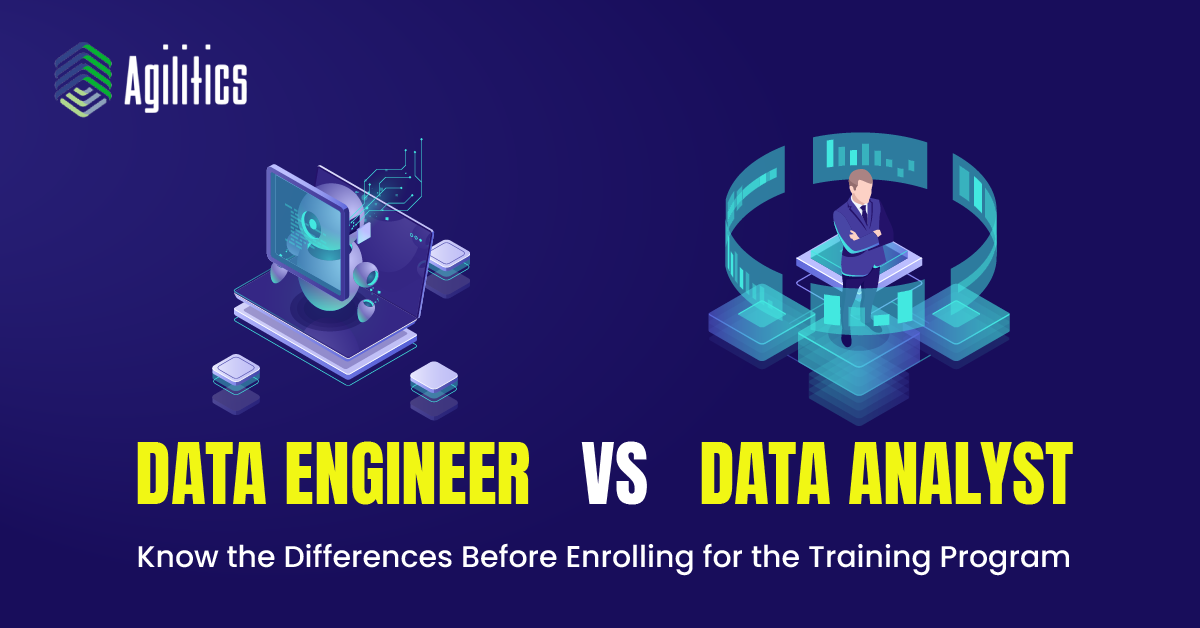Data Analytics can be titled the study of data sets to draw inferences from data that utilize specific software-related systems. As such, it can focus on several regions with very well-defined objectives. These data engineers can create and develop technologies that allow analysts and data scientists to focus on convenient processing and data collecting applications.
However, data engineers are different from data analysts, as the latter feature those who can generate insights from data. These data analysts can use different forms of technologies and perform processing functions independently. The result of this is the creation of insights. Data analysts, unlike engineers, are unable to, or even unwilling to engage in any form of data modeling at all.
These data engineers are engaged in data infrastructure management. They can engage with the ideas of data processing automaton and can, as well, deploy large-scale models. Their analysis can let their primary role be master builders.
Here are the roles and responsibilities of the data analyst:
- They are involved in converting different kinds of numerical data into several usable formats.
- They can utilize tools like Microsoft Excel, SPSS, and SAS Miner, which can be understood well.
- They must have certain degrees of understanding regarding Python, SQL, R, and JavaScript.
- They can mine data, visualize data, explore an analysis of data.
- Statistics are a necessary skill for that person or team.
On the contrary, here are the responsibilities of the data engineer:
- They participate in the preparation of data for analytical and operational reasons.
- They, like data analysts, can thoroughly understand programming languages like Java, SAS, SQL, and Python.
- There are several frameworks required for data analysis, like Pig, Hive, Hadoop, Apache Spark, MapReduce, NoSQL, and Data Streaming.
- They have great expertise in creating big data warehouses through ETL.
There are several differences between data engineers and data analysts
- Data analysts are in charge of taking the actions that affect companies’ present scope. On the contrary, data engineers create a platform on which scientists and analysts work.
- Data analysts can employ a myriad of descriptive analyses as well as approaches of static modeling to summarize the information.
However, despite being able to do the same, data engineers do not share this as the primary function. In other words, they can maintain and develop pipelines of data. - With regards to examining data, data analysts deliver in ways that teams can understand. As such, they can assess current performance. They can plan for the far and near future. They may also develop strategies that improve website visits and sales while also identifying trends among different kinds of user groups.
- Data analysts can undertake different kinds of tasks, although several of these are also performed by data scientists, like data cleansing, visualization, and analysis.
Mindsets of data engineers are often more focused on optimization and building. As such, data analysts can deal with data analysis and communication.
- Data analysts can learn machine learning knowledge as an additional asset, but such is not necessary or even a primary requirement. Data engineers need not know machine learning, but they need to know more about core computing.
- Did you know that you can get data-driven businesses, which can be transformed from traditional firms with the assistance of data analysts? Data engineers make sure that the required data is received and then converted.
Finally, it must be stored and made available to several different users accurately and timely. The data engineers have a background in the development of software, such that they are even more likely to switch between technologies while integrating them to reach a common goal.
- A thorough investigation reveals the relevant data available for business, as per a data analyst’s job. Data engineers need to ensure that the data is accurate, such that they can adapt to changing needs of the business.
- The very critical talent is SQL. It does not matter if you are a data analyst or a data engineer. For somebody with knowledge and skillful training in SQL, the most beautiful career choices are in data analysis
- The average annual pay of a data analyst is about fifty-nine thousand dollars. The annual salary of a data engineer is about ninety thousand dollars.
- The data engineers can earn anything between a hundred thousand to about hundred and fifty thousand dollars as well regarding the experience, talents, and location. As such, more experienced people in this profession can earn about one hundred and seventy thousand dollars.
Definition
Data engineers remain involved in the data preparation process. They can design the entire architecture while building, testing, and maintaining it. Data analysts can examine the numerical data and then use the same to assist businesses in creating better decisions.
Focus
A data engineer can focus on the database architecture, building pipelines that integrate the multiple repositories of data within the firm. They can also do the same from secondary sources. On the other hand, data analysts are interested in numbers while creating operational reports based on data of enterprises through visualization tools.
Works On
Data engineers can work with cloud platforms, data lakes, data warehouses located in the cloud, and all forms of on-premise technology, ETL and data warehouses, and ETL.
Job Responsibility
Data engineers’ jobs entail creating, maintaining, and testing a complete architecture of data. They can use different statistical models which can assure the accuracy of data.
At the same time, a data analyst’s tasks can include representation of data through visualization and reporting, acquisition of data, and efficiency optimization of statistical data.
Techniques Used
Data engineers can use management tools Apache Hadoop and a data engineering framework. On the other hand, data analysts use descriptive and inferential statistics.
Programming Language
Apache Spark REST API is the most excellent tool used by a data engineer, while analysts are more inclined to use Matlab, SQL, Python, and R.
Tools Used
Data engineers can use Hadoop, Yarn, and Kubernetes. On the other hand, data analysts can use Microsoft Excel, BI tools, and SQL.
Use Cases
Data engineers are invested in Social media and Market Analysis. Data analysts are invested in Event-driven and Data Capture.
Experience
Cloud infrastructure and visualizations are primarily on the resume of data engineers. Cloud analysts are interested in Certification in Data analysis and knowledge of SQL.
Skill Sets
Data engineers can use Hadoop-based Analytics, Data architecture, Pipelining, and Machine learning concept knowledge. On the other hand, Data Warehousing, Scripting and Statistical, Skills Adobe & Google Analytics and Reporting are the most important.
Career Path
The career path of data engineers involves roles in Senior Data Engineer, Data Scientist, and Lead Software Engineer. The career path of data analysts delves into Senior Data Analyst, Business Analytics and Analytics Manager.
We strive to provide business professionals with the skills and knowledge necessary to increase work performance and drive greater return on investment for the global customers we support. Agilitics delivers customized technology and management training solutions to large corporations and government agencies around the world.


